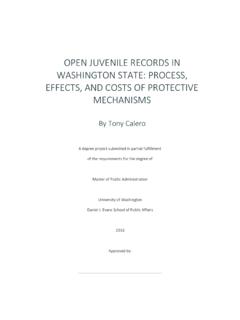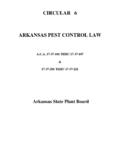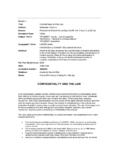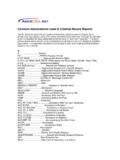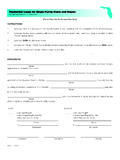Transcription of EXECUTING SEARCH WARRANTS - Natural Horsemanship®
1 EXECUTING SEARCH WARRANTS Police with a SEARCH warrant ! Open the door or we'll kick it in! . Excerpt from To Live and Die in The execution of a warrant to SEARCH a home is, from start to finish, a frightening display of police power. It is nothing less than an armed invasion into the sanctity of the home. And although most people can avoid having their homes searched by not committing crimes, the law views the procedure as one that must be closely and scrupulously regulated. It accomplishes this in two ways. First, the law strictly controls when a judge may issue a warrant ; , the probable cause requirement. Second, it regulates the manner in which WARRANTS are People who watch a lot of television might think that EXECUTING SEARCH WARRANTS is a snap just break in and look around for something suspicious. But in real life, it is both dangerous and tedious work.
2 It also requires a thorough understanding of a body of law that regulates virtually everything officers do, from knocking on the door to leaving a receipt on the way out. For example, there are rules covering the manner in which entry is made, officer safety precautions, what places and things may be searched, and what items may be seized. There are rules that specify who may accompany officers when they enter, the legality of videotaping the SEARCH , when officers may detain the occupants, when they can remove files and computers for an extended SEARCH at another location, and the preparation and filing of post- SEARCH paperwork such as returns and inventories. And then there are the rules for obtaining and EXECUTING specialized WARRANTS , such as covert entry WARRANTS , anticipatory WARRANTS , WARRANTS conducted by special masters, and WARRANTS for computer data.
3 Simply put, EXECUTING SEARCH WARRANTS is a complex undertaking that requires a command of a wide variety of rules rules the courts enforce by suppressing some or all of the evidence discovered on the premises. In this article, we examine these rules, with emphasis on the most common type of warrant the warrant to SEARCH a house for contraband, such as drugs, illegal weapons, or stolen property. Two things before we begin. First, in the 2002 editions of Point of View we covered the subjects of probable cause, the preparation of WARRANTS , and specialized SEARCH WARRANTS . Those articles may be downloaded from Point of View Online at Second, because of its scope and complexity, the subject of knock- notice is covered in the accompanying article. PRE- SEARCH PLANNING. As in most things, planning is essential to the success of warrant execution.
4 Not only will planning help make it safer and more efficient, if things get messy the officers'. 1 See People v. Peterson (1973) 9 717, 722, [ The propriety of the execution of the SEARCH warrant is essential to establishing the admissibility of the evidence upon which the People's case rests. ]; United States v. Ramirez (1998) 523 US 65, 71 [ The general touchstone of reasonableness .. governs the method of execution of the warrant . ]; Wilson v. Layne (1999) 526. US 603, 611 [ (T)he Fourth Amendment does require that police actions in execution of a warrant be related to the objectives of the authorized intrusion. ]; Groh v. Ramirez (2004) 540 US __ [ It is incumbent on the officer EXECUTING a SEARCH warrant to ensure the SEARCH is lawfully authorized and lawfully conducted. ]. 1. attempt to plan things out is a factor that is highly relevant in determining the overall reasonableness of their Entry strategy There are no rigid rules that must be followed when Instead, the courts require only that officers enter in a reasonable manner with due regard for the safety of everyone, and the need to prevent the occupants from destroying evidence or otherwise sabotaging the KNOCK-NOTICE: Officers must plan on complying with the knock-notice requirements unless they reasonably believe that compliance will be excused for good cause.
5 As noted, knock-notice is covered in the accompanying article. DAMAGING PROPERTY: Planning should include a procedure for making a forced entry if need As a general rule, a forced entry is permissible if it was reasonably necessary. In the words of the Supreme Court, [L]aw officers constitutionally may break and enter to execute a SEARCH warrant where such entry is the only means by which the warrant effectively may be executed. 6. FLASHBANGS: If officers reasonably believe that armed resistance or destruction of evidence is likely, they may consider using flashbangs when making entry, especially before making a no-knock entry. Because officers have been using good judgment in determining when and how to use flashbangs, court authorization is not required. For example, in Langford v. Superior Court,7 the California Supreme Court refused to require the LAPD to obtain court authorization because, (1) the department had reduced the explosive power of its flashbangs to minimize the risk of injury, (2) the department prohibited the use of flashbangs unless officers could see fully into the targeted room before tossing the flashbang inside, and (3) officers were required to obtain authorization from a police administrative panel which gave its approval only if it determined that flashbangs were the safest means of making a forcible entry.
6 MOTORIZED BATTERING RAMS: Using a motorized battering ram to get inside is highly dangerous because, among other things, it may cause a fire by rupturing electrical or gas lines. It might even cause the building to collapse. Consequently, motorized battering rams may be used only if, (1) the issuing judge authorized it; and (2) when the ram was utilized, officers reasonably believed that evidence inside the premises was presently being destroyed, or there was an immediate threat of resistance from the occupants which posed a serious danger to Other pre- SEARCH issues 2 See, for example, v. Heldt ( Cir. 1981) 668 1238, 1261-2. 3 See Wilson v. Arkansas (1995) 514 US 927, 934. 4 See Wilson v. Arkansas (1995) 514 US 927, 934 [ (W)e have little doubt that the Framers of the Fourth Amendment thought that the method of an officer's entry into a dwelling was among the factors to be considered in assessing the reasonableness of a SEARCH or seizure.]
7 ]. 5 See United States v. Banks (2003) 540 US __ [ Since most people keep their doors locked, entering without knocking will normally do some damage ]. 6 Dalia v. United States (1979) 441 US 238, 247. ALSO SEE United States v. Ramirez (1998) 523. US 65, 71 [ Excessive or unnecessary destruction of property in the course of a SEARCH may violate the Fourth Amendment, even though the entry itself is lawful. ]; United States v. Banks (2003). 540 US __ [ (P)olice in exigent circumstances may damage premises so far as necessary for a no- knock entrance without demonstrating the suspected risk in any more detail than the law demands for an unannounced intrusion simply by lifting the latch. ]. 7 (1987) 43 21. 8 See Langford v. Superior Court (1987) 43 21, 29-32. 2. BRIEFING: Before heading out, everyone on the SEARCH team must be thoroughly briefed on what places and things they may SEARCH and what evidence they may This helps ensure that the SEARCH is properly limited in scope and does not degenerate into an illegal general SEARCH .
8 As the Court of Appeals observed, In order for a warrant 's limitations to be effective, those conducting the SEARCH must have read or been adequately apprised of its terms. 10. For example, in Guerra v. Sutton11 a SEARCH by INS agents was ruled unlawful because, said the court, the agents had differing views of the type and scope of the local police warrant , demonstrating that they were not given an advance briefing as to the source and extent of their authority to enter, SEARCH , and arrest.. DOUBLE-CHECK PROCEDURE: If officers may have trouble determining whether a document or other item may be seized under the warrant , there should be a procedure in place whereby they can get a determination from one of the lead For example, in v. Heldt13 FBI agents conducted extensive searches for documents at three Church of Scientology offices.
9 At the pre- SEARCH briefing, they were instructed that if they had questions regarding particular documents, they should seek out their SEARCH team leaders who would determine whether the documents fell within the scope of the WARRANTS . On appeal, this was one of the circumstances cited by the court as proof the SEARCH was conducted in a reasonable manner. THE TEN-DAY RULE: SEARCH WARRANTS must be executed within ten days after they were issued. After that, they are When calculating ten days, do not count the day on which the warrant was It will sometimes be impractical or impossible to complete the SEARCH within ten days. This commonly occurs when officers remove a large number of documents to be read later, when they remove a computer for an off-site SEARCH , or when the warrant 9 See v. Wuagneux (11th Cir. 1982) 683 1343, 1353 [ (A)ll the agents were adequately briefed and supervised in this case.]
10 ]; People v. Bradford (1997) 15 1229, 1306-7 [ The record does not demonstrate that the officers had not been briefed or prepared as to the objects of the SEARCH ]; v. Whitten (9th Cir. 1983) 706 1000, 1009-10 [ Officers conducting a SEARCH should read the warrant or otherwise become fully familiar with its contents, and should carefully review the list of items which may be seized. ]. 10 v. Heldt ( Cir. 1981) 668 1238, 1261. 11 (9th Cir. 1986) 783 1371, 1375. 12 See v. Wuagneux (11th Cir. 1982) 683 1343, 1353 [ (T)his [double-check procedure]. indicates an attempt by the responsible officials to assure that the SEARCH is conducted in a manner that minimizes unwarranted intrusions into privacy. ]; v. Sawyer (11th Cir. 1986). 799 1494, 1509 [ Moreover, during the SEARCH , the case agent did review items seized and determined a quantity of records reviewed were not those of SMC and left them on the premises.

